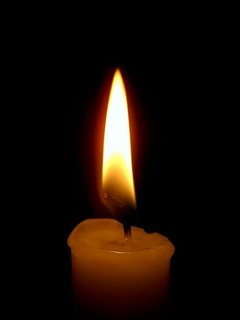 This morning, the LA Times ran a story on Dr. Wafa Sultan, a previously unknown Syrian-American psychiatrist shot to fame by her provocative interview last month on Al Jazeer television. It's a good overview - but not as in-depth or reflective as Saturday's NY Times profile: "Muslim’s Blunt Criticism of Islam Draws Threats." Both pieces bring God-talk into the open spaces, but the NY Times pulls at a less-obvious but just as important thread: the quest for God.
This morning, the LA Times ran a story on Dr. Wafa Sultan, a previously unknown Syrian-American psychiatrist shot to fame by her provocative interview last month on Al Jazeer television. It's a good overview - but not as in-depth or reflective as Saturday's NY Times profile: "Muslim’s Blunt Criticism of Islam Draws Threats." Both pieces bring God-talk into the open spaces, but the NY Times pulls at a less-obvious but just as important thread: the quest for God.What did Dr. Sultan say on Al Jazeera? I encourage you to read both articles, but essentially she harshly accused Muslim clerics and leaders of leading her people on a downward spiral of violence and self-pity. To support her point, she provocatively compared the Muslims unfavorably to the Jews, praising the Jews “for working hard to rebuild their community after the Holocaust” while criticizing “violent reactions by Muslims to their plights, whether in response to satirical Danish cartoons or subjugation in the Palestinian territories” (LA Times).
Obviously, these views got her in very hot water. But what grabbed my attention was how these views developed out of a crisis of faith: "I have reached the point that doesn't allow any U-turn. I have no choice. I am questioning every single teaching of our holy book," she told the NY Times.
What led her to question her faith in the God of Islam? According to the NY Times:
Dr. Sultan grew up in a large traditional Muslim family in Banias, Syria, a small city on the Mediterranean about a two-hour drive north of Beirut. Her father was a grain trader and a devout Muslim, and she followed the faith's strictures into adulthood.In the LA Times interview she put it this way: "That was the turning point of my life. . . . I was traumatized. I lost faith in God — or their God — and started to question every single teaching of ours."
But, she said, her life changed in 1979 when she was a medical student at the University of Aleppo, in northern Syria. At that time, the radical Muslim Brotherhood was using terrorism to try to undermine the government of President Hafez al-Assad. Gunmen of the Muslim Brotherhood burst into a classroom at the university and killed her professor as she watched, she said.
"They shot hundreds of bullets into him, shouting, 'God is great!' " she said. "At that point, I lost my trust in their god and began to question all our teachings. It was the turning point of my life, and it has led me to this present point. I had to leave. I had to look for another god." [italics mine]
So where does that leave her? She told the NY Times that she no longer practices Islam: "I am a secular human being," she said.
While Dr. Sultan’s story is unique in many ways, it reflects what is going on all around us. People examine the gods they worship and find them wanting, so they search for “another god.” Many find comfort in a secular worldview - sometimes because it seems easier to live life on their terms but sometimes because they’ve seen religion so misused that it’s easier to believe the world’s a better place without it or God.
But, as Dr. Sultan’s story shows, a thirst for justice and right-ness and truth still persists. “Somebody has to help free the Muslim people from these wrong beliefs,” she forcefully told the NY Times. Something’s wrong with the world and it’s got to be fixed. And so, I believe, the quest for the one true God goes on.
As a follower of Jesus, I resonate with Dr. Sultan’s burden to free people from a false worldview. It is a burden of many Christians carry. But how do we show people so badly traumatized by religion that there is a true God – a God who is good and righteous, holy and loving?
I don’t think it can be accomplished with words. We have to show them. And we can’t even do that: only Jesus can. As Christians, our task is to live in him – and then his life will shine through us to people questing in darkness. We will be so salty that people will finally know where to quench their thirst for the one true God.
Stories like this one are good opportunities to bring God-talk out into the open. They are also opportunities to examine ourselves and take stock of our lives. Are we living in him so others can find him to? Or are our words empty because our lives are too?
(Image: dunkv)